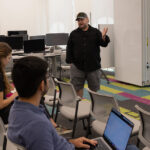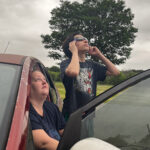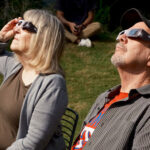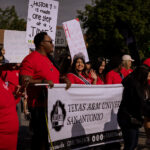
Melody Mendoza
As the spring semester comes to a close, Faculty Senate prepares for their second senate elections. The addition of two new senators from each school is expected to double the size of the advisory body.
Nomination ballots went out today via SurveyMonkey and will close at noon April 13. Each faculty member can nominate two senators from their school — School of Business, Arts and Sciences and Education and Kinesiology. The three faculty members receiving the greatest number of nominations will comprise the slate of nominees for the election.
There are 100 full-time faculty who are able to serve as senators, Richard Green, Faculty Senate president and business professor, said in an email to faculty.
The senate will contact each nominee to determine their level of interest, and an election ballot with all senators from each school will go out to faculty. The ballot will close April 20.
Faculty Senate’s first meeting with new senators will be May 3, which is the last meeting of the semester.
During the April 5 Faculty Senate meeting, senators discussed the elections, a reimbursement policy and briefly reviewed two past agenda items on a modified grading system and the privacy of a faculty office.
Six faculty members also sat in on the meeting at Brooks City-Base Campus, contributing feedback and expressing concern, which Durant Frantzen, parliamentarian and criminology professor, said was the most faculty members he’d seen at a meeting since the senate formed in November 2010.
Senate welcomes increased faculty presence
During a phone interview, Frantzen shared his thoughts on the senate’s role in providing a means of communication for faculty members. He said the senate’s purpose is to be a representation of the faculty with ongoing discussions that bring faculty concerns to the administration’s attention.
In the next academic year and with the addition of new senators in the next month, Frantzen said he thinks the senate will continue as a discussion body. He said over time, the senate will be geared toward policy setting when the faculty population grows and the growth cycle of the University slows down.
The University is growing so fast that it’s important for the senate to see how processes work before assessing them, he said.
Although the senate has seen increased attendance, Frantzen said getting faculty acclimated with the role of Faculty Senate has been a challenge.
“The more faculty at meetings the better,” he said. “As the Faculty Senate starts to establish its presence on campus and add more members next month … the more faculty will have a better understanding of what happens at Faculty Senate and how they can express their viewpoints.”
The University as a start-up institutional also has challenged the senate to create brand new policies and procedures from scratch.
“There are so many policies that Faculty Senate could potentially look at,” he said. “It’s a matter of taking issues in a very contemplative manner. We have to make sure all options are explored and that we’re doing the right thing for the University.”
In doing so, Frantzen said the senate’s challenge is to implement the right policies and then to communicate them to faculty and make sure they are in compliance.
Recently, the senate is working on a faculty handbook and post-tenure review process.
Although the senate hasn’t created any policies since formed, Frantzen said the body acts as a means of communication rather than a policy setting entity at this time.
“We want to discuss issues as thoroughly as possible and brainstorm before we recommend and come up with policies that will affect faculty,” he said.
He explained that senators are going back to their departments to get feedback, which takes time. “It wouldn’t be wise to implement policy without being thoroughly discussed at the department level.”
“It’s a balance,” he said. “We want to adapt things that work as best as possible in the unique state that we are in.”
The unique state Frantzen referred to poses another challenge — the University’s growth. As the University grows and changes, he explained that the senate has to be aware of many things and be actively engaged.
For now, the senate continues discussing recent concerns and recommendations and seeks faculty input.
April meeting coverage
In other news, Green raised a faculty concern about the process to receive reimbursement from an educational trip.
The process requires faculty or staff to submit a request for travel expense reimbursement within 15 days of return. Faculty were concerned with the deadline because of the multi-step process to submit the form, especially with Brooks Campus being 10 miles apart.
Snow confirmed that the form requires review from the person’s supervisor and school head. Then, the school head would send the form to the office of the provost for initial and accounts payable at Gillette Campus.
In response, Snow explained to the senate that the decision was made to eliminate a step in the process. Now, the form does not have to go through the office of the provost. After the school head signs the paperwork, it will go straight to finance and administration.
Also, he said the 15-day deadline is more of a strong guideline that will stay intact, but added that the penalty will go away. The penalty, Snow said, was that the faculty or staff wouldn’t be reimbursed after the 15 days.
Senators suggested an electronic form to easily submit from campus to campus, but others said auditors would want to see a hard copy.
Snow indicated that the University was not ready for such a change at this time.
In the end, the senate voted to resolve the concern.
History Professor Ed Westermann presented the results of a faculty survey on a modified grading system, which was presented at the February senate meeting and reviewed at the March meeting. Read previous story.
Faculty suggested the senate survey students.
Because the senate tabled the item because of an overall opposition from faculty at this time, senators agreed there was time to survey the students at a later date.
The final three items were tabled: the draft proposal for post-tenure review procedure, a policy for faculty to use private electronic devices and discussion of who has the right to enter a faculty office.
The latter two items were discussed at a previous meeting after information technology personnel removed a network hub and a wireless access point from business Professor Allen Preston’s office.
Preston, present at the meeting, brought up the incident noting that he was not notified of the misuse of his equipment before the removal or after.
The Mesquite reported a statement from IT: Two ITS staff members approached the departmental representative and informed her about these unauthorized devices; they requested access to the room to review the potential security breach, and requested that the department representative accompany them, both of which the departmental representative gladly did. The ITS staff members proceeded to disconnect the equipment from the network, complied and handed the equipment to the department chair.
Preston said he was in class when this occurred.






